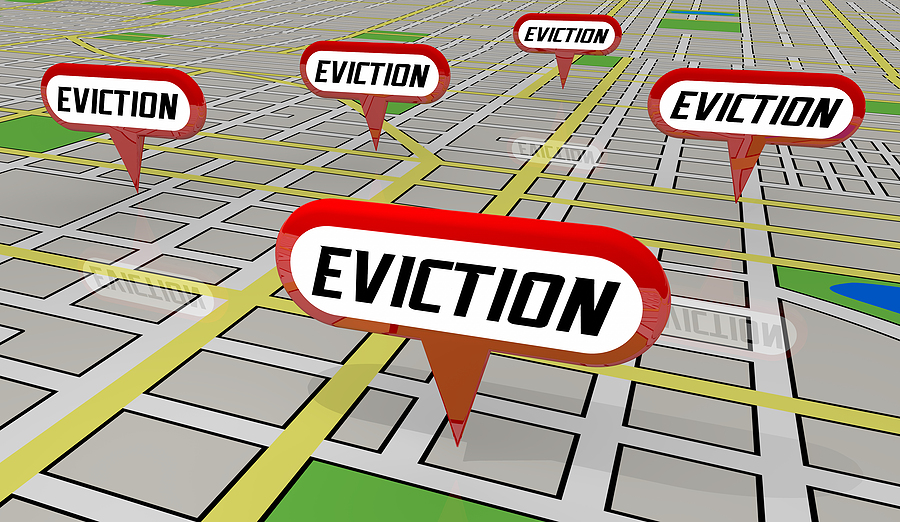“How long does it take to evict a tenant?” It’s a question I receive frequently, especially from new landlords who are considering investing in real estate. I’m a firm believer that if you provide good quality housing and perform good screening to applicants, you dramatically increase your chances of bringing on a good tenant who understands his obligation to pay rent, even when he is having financial troubles. The tenant with a 700+ credit score cares more about a blemish on his record than someone with a 500 credit score. A renter with a high credit score will not want to live in a slum.
The first step is to file a Landlord/Tenant Complaint at the local magistrate court where the property is located. The tenant will need to have violated the terms of the lease in some way before you file a complaint, such as late rent or behavioral issues. The cost to file the complaint varies, based on the dollar amount of late rent and the number of tenants who need to be served, but is typically between $150-$200. A hearing date will be assigned to the case, typically between seven to fifteen days from the date you filed. Some courts will let you choose at the time of filing – others will mail you a date that they assign. The landlord will receive a copy of the complaint in the mail, and the tenant will have the notice posted by a constable.
On the day of the hearing, make sure you have all your documentation in order. If filing for late rent, have copies of the tenant ledger that shows the history of rent charges and payments. If filing for behavioral issues, make sure you have proof that you have tried to correct the bad behavior in the past and are coming to court as a last resort. A judge will not look too kindly on a landlord who is filing for eviction after only one noise violation or one pet violation. Pennsylvania has two options for eviction: “pay-and-stay” and straight. If the complaint is filed for monetary reasons, it will nearly always be a pay-and-stay. The tenant has until the time the constable shows up to remove them from the property (the actual eviction) to pay the amount in full to be allowed to stay in the property. For behavioral issues a landlord can request a straight eviction, meaning that the tenant will be evicted on the future date, unless the tenant chooses to move out prior on their own accord. Tenants tend not to show up to court for late rent complaints. They will show up for behavioral complaints. The way a judge presides over the hearing varies greatly, and it often depends on the type of complaint. For monetary, the judge will simply ask the landlord to verify the rent, security deposit held, and a breakdown of the amounts owed. The judge will then ask the tenant if they agree. For behavioral, it’s more like a normal court scene. The judge may ask the landlord to present an opening argument and call witnesses, with the tenant being asked to do the same and to cross-examine. In that situation, the judge usually will not hand down a decision at the time but will mail out the ruling.
After the ruling is made, the losing party has ten days to appeal the decision. Appealing the decision means the original case is thrown out and now moves onto the Court of Common Pleas. At this level, you will need an attorney to represent you. You can easily spend $2000-$4000 in attorney fees just to file the proper paperwork, so in the rare event a tenant appeals, you will have to really consider if the eviction is worth pursuing.
If the tenant has not appealed after ten days, you can then file for the Order of Possession. This cost could range from $100-$150. You must go back to the courthouse to file this document. The document will be posted on the tenant’s door informing them that the constable will be out in about ten days to remove them from the property. At some point, the landlord should receive in the mail a form with the constable’s name and number, as well as the date and time of the scheduled eviction.
On eviction day, plan to have new locks with you to secure the property. The constable will go in and do a sweep of the property to make sure no one is inside. Hopefully the tenant has taken all his belongings with him. If not, the tenant has ten days to contact the landlord to pick up his belongings. The landlord cannot immediately throw out the personal property, nor place it all at the curb. The landlord must protect the property for at least ten days. The landlord cannot charge the tenant for storage fees for the first ten days. By law, the tenant has up to thirty days to retrieve his property, but only if the tenant has reached out to say he will be returning for it. Starting on day eleven, the landlord can begin assessing a storage fee (whether the property is stored at the property or moved to a storage unit) which is due before allowing the tenant access.
The typical eviction process in Pennsylvania will take between 35-45 days to remove the tenant but may involve another thirty days in managing the tenant’s personal property. Few Landlord/Tenant Complaints make it all the way to eviction. Oftentimes the goal is to be an attention-getter to correct a lease violation.












